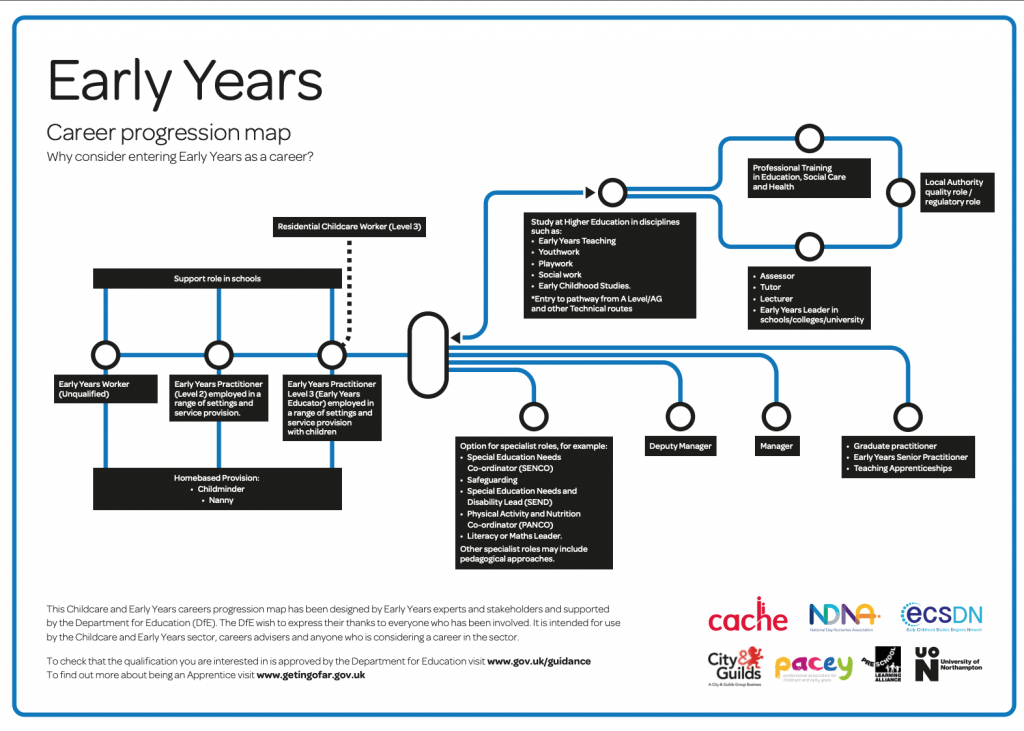1. How to become a Nursery Teacher? Nursery Teacher qualifications
2. Nursery Teacher Key Responsibilities
3. Nursery Teacher Salary
4. Nursery Teacher Career
1. How to become a Nursery Teacher?
You can get into this job through:
- a university course
- working towards this role
University
You’ll need to get early years teacher status (EYTS) by completing an early year initial teacher training course. There are several ways to do this:
- undergraduate entry if you’re taking an early childhood-related degree, and maybe working in early years setting
- graduate entry if you have a degree but limited experience with children and are not currently working with them
- graduate employment if you have a degree and are working in an early years setting
- assessment only if you’re a graduate with a lot of experience across the 0 to 5 age range, and also have knowledge of key stage 1 and 2 in schools
Early years teacher status qualifies you to teach children up to age 5. If you want to teach older children or teach in a primary school, you’ll usually need to get qualified teacher status (QTS).
Entry requirements
You’ll usually need:
- GCSEs at grades 9 to 4 (A* to C) in English, maths and a science subject or equivalent qualifications
- 2 to 3 A levels for a degree
2. Nursery Teacher Key responsibilities | Job Description
Skills and knowledge
You’ll need:
- knowledge of teaching and the ability to design courses
- sensitivity and understanding
- the ability to work well with others
- patience and the ability to remain calm in stressful situations
- the ability to understand people’s reactions
- the ability to come up with new ways of doing things
- to be flexible and open to change
- excellent verbal communication skills
- to be able to use a computer and the main software packages competently
Restrictions and requirements
You’ll need to:
- pass numeracy and literacy skills tests
- pass enhanced background checks, as you may be working with children and vulnerable adults
What you’ll do
Day-to-day tasks
In this role you could be:
- planning and preparing activities and materials
- setting out activities before classes and tidying up afterward
- speaking to parents and carers about their children’s development
- monitoring children’s progress, and identifying and dealing with any issues
- supervising nursery workers, teaching assistants and volunteer helpers
- attending parents’ evenings and training sessions
3. Nursery Teacher Salary
- The average Nursery teacher salary is £27,356. This is 20.6% below the national average advertised salary of £34,434.
- Year-on-year pay for Nursery teacher jobs has gone up 21.1% year-on-year, compared to an annual change of 1.0% for all jobs.
- The number of Nursery teacher job ads is 28.6% lower than last year, with 754 current vacancies.

SOURCE & STATS: Adzuna March 2019.
4. Nursery Teacher Career
Opportunities for Progression:
Once qualified, you could move into management of a nursery or group of nurseries.
You could also work as a supply teacher or take further training to become a primary school teacher or play therapist.
1. How to become a Nursery Teacher? Nursery Teacher qualifications
2. Nursery Teacher Key Responsibilities
3. Nursery Teacher Salary
4. Nursery Teacher Career
1. How to become a Nursery Teacher?
You can get into this job through:
- a university course
- working towards this role
University
You’ll need to get early years teacher status (EYTS) by completing an early year initial teacher training course. There are several ways to do this:
- undergraduate entry if you’re taking an early childhood-related degree, and maybe working in early years setting
- graduate entry if you have a degree but limited experience with children and are not currently working with them
- graduate employment if you have a degree and are working in an early years setting
- assessment only if you’re a graduate with a lot of experience across the 0 to 5 age range, and also have knowledge of key stage 1 and 2 in schools
Early years teacher status qualifies you to teach children up to age 5. If you want to teach older children or teach in a primary school, you’ll usually need to get qualified teacher status (QTS).
Entry requirements
You’ll usually need:
- GCSEs at grades 9 to 4 (A* to C) in English, maths and a science subject or equivalent qualifications
- 2 to 3 A levels for a degree
2. Nursery Teacher Key responsibilities | Job Description
Skills and knowledge
You’ll need:
- knowledge of teaching and the ability to design courses
- sensitivity and understanding
- the ability to work well with others
- patience and the ability to remain calm in stressful situations
- the ability to understand people’s reactions
- the ability to come up with new ways of doing things
- to be flexible and open to change
- excellent verbal communication skills
- to be able to use a computer and the main software packages competently
Restrictions and requirements
You’ll need to:
- pass numeracy and literacy skills tests
- pass enhanced background checks, as you may be working with children and vulnerable adults
What you’ll do
Day-to-day tasks
In this role you could be:
- planning and preparing activities and materials
- setting out activities before classes and tidying up afterward
- speaking to parents and carers about their children’s development
- monitoring children’s progress, and identifying and dealing with any issues
- supervising nursery workers, teaching assistants and volunteer helpers
- attending parents’ evenings and training sessions
3. Nursery Teacher Salary
- The average Nursery teacher salary is £27,356. This is 20.6% below the national average advertised salary of £34,434.
- Year-on-year pay for Nursery teacher jobs has gone up 21.1% year-on-year, compared to an annual change of 1.0% for all jobs.
- The number of Nursery teacher job ads is 28.6% lower than last year, with 754 current vacancies.

SOURCE & STATS: Adzuna March 2019.
4. Nursery Teacher Career
Opportunities for Progression:
Once qualified, you could move into management of a nursery or group of nurseries.
You could also work as a supply teacher or take further training to become a primary school teacher or play therapist.

